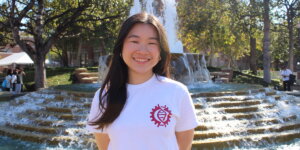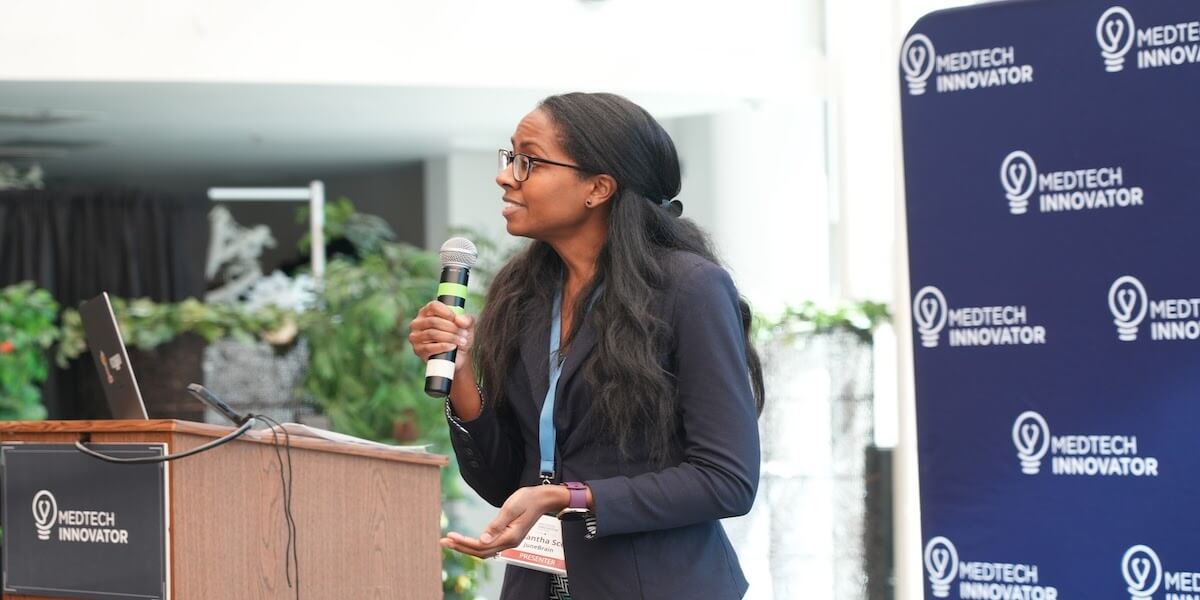
Scott Speaking about Junebrain at MedTech pitch competition in March
When Samantha Scott (Ph.D. ’14) first started fundraising for JuneBrain, her startup focused on eye and brain health, investors pulled her aside with a warning.
Don’t disclose that you’re also a patient. People will think you’re not capable of being a CEO.
At first, Scott, who is diagnosed with myasthenia gravis — a rare disorder where nerve impulses are not properly transmitted to the muscles — didn’t know how to react. But after a while, she realized that any investor who felt that way did not fit the inclusive culture of JuneBrain.
“If you have a disability or need some level of accessibility, that’s just not an issue for us,” Scott asserts. “Now I look for it as a red flag that they are not a good match for us. Our network is awesome because it’s filled with people who see disability as a strength — not something to hide or cover-up.”
Today, Scott is the founder and CEO of JuneBrain, whose AI-powered eye-scanning device for eye and brain diseases like multiple sclerosis (MS) and age-related macular degeneration may be a game changer for tele-medicine.
It’s the very device that, if had been available a few years earlier, may have helped Scott herself.
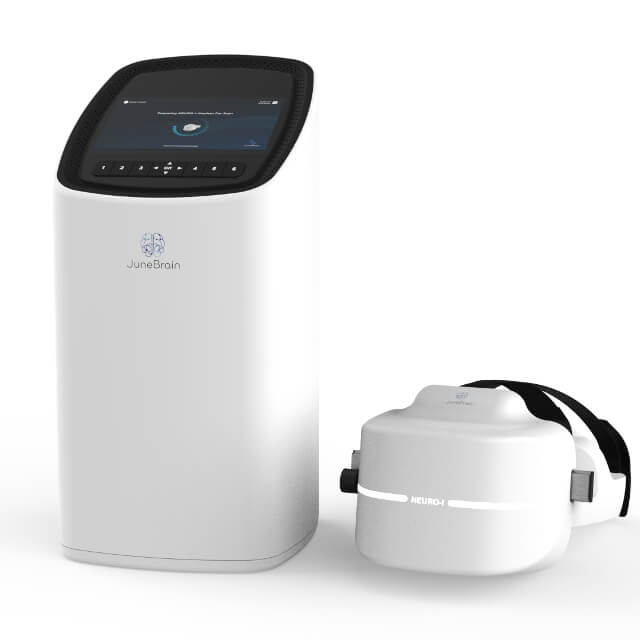
JuneBrain’s tele-health device and A.I. software products are intentionally designed to work together and optimize remote assessment and monitoring of neurological diseases.
As a Ph.D. student at the USC Viterbi School of Engineering, Scott was about halfway done with her doctorate in biomedical engineering when she started getting very sick.
It would take five years for her to finally get her diagnosis. According to the New York Times: “It often starts in the eyes — with a droopy eyelid and double vision. But then it usually spreads to other parts of the body. Patients with myasthenia have muscles that tire out much more quickly than normal. There are fewer than 400 cases per million people.”
As the JuneBrain website states: “When Dr. Scott was diagnosed with myasthenia gravis, she found an immediate flaw in our healthcare system: her neurologist only had the bandwidth to see her once a year. As a result, she was left on her own to understand how her disease was changing and communicate those changes to her doctor.”
It was her husband who initially suggested that she use her background in biomedical engineering to find a novel way to monitor her health from home. She began to ask herself: What if there was an easy way to diagnose and monitor the progression of diseases like myasthenia gravis and M.S.? What if you could gather some objective information about your eyes at home and have that information wirelessly to your doctor in minutes?
JuneBrain was the answer — “June” for the bugs local to Scott’s high school hometown in Tennessee and for the summer month when the company was founded (which coincidentally is Brain Awareness Month) and “brain” for the organ Scott loves so much.
Scott’s diagnosis showed her the patient side of biomedical engineering and gave her a different perspective on all the technical classes she had attended throughout her education.
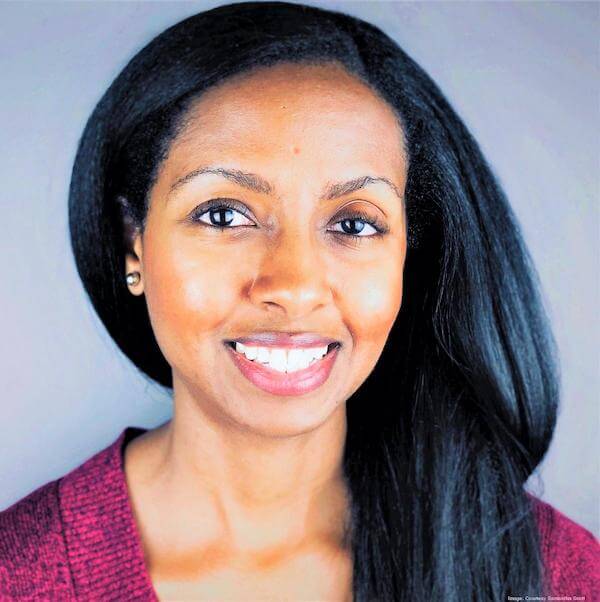
JuneBrain Founder Samantha Scott was diagnosed with myasthenia gravis half through her doctorate in biomedical engineering
“It gave it a very human perspective,” Scott reflects, “and I think that’s part of why it was so important to me to do translational work, doing something that gets cool technologies into people’s hands as soon as possible.”
The good news: she had already received a master class on such work as part of her research at USC’s Biomimetic MicroElectronic Systems Engineering Research Center (BMES-ERC). A highly coveted center funded by the National Science Foundation, BMES-ERC had a rather immodest goal: restoring sight to the blind. In 2013, the center’s work led to the creation of the artificial retina and the first FDA approved device to restore sight to the blind.
Scott was part of a multidisciplinary effort to understand how a retinal disease affected brain function and architecture. Her work with retinitis pigmentosa, which causes progressive vision loss, involved working with patients before and after they received the Argus II retinal implant as a treatment to restore sight. Scott was working directly with patients, a rank she had recently come to join.
“I saw people before and after they got the prosthesis — there was an immediate impact on their lives, and I wanted to be a part of placing more transformational technologies like this in patients’ hands.”
“I wonder what it would be like to live in a world where it was always June.” – L. M. Montgomery
In her youth, Scott wanted to be a garbage woman.
She liked how the trucks mechanically moved and operated and would watch them with interest. She also wanted to be a pediatrician. Medicine enamored her, and if someone collapsed in front of her, she wanted to be able to do something about it. Scott had always imagined herself helping people. Her early desire to help people tangibly and immediately is a clear motif she followed throughout her education and is easily recognizable in her present work at JuneBrain.
“I’ve always been a nerd,” Scott blithely admits, further explaining that she loves the nerd lifestyle, which, as she defines it, consists of being comfortable always asking questions and trying to understand things. It may also include a fair number of books and video games, but more importantly, never losing the passion for learning.
Scott’s biggest inspiration throughout her life has always been nerds. Even now, she says her company, JuneBrain, is assembled from what she deems as tech and business nerds because although they love the technology, science and engineering of their work, they are most motivated by the desire to learn more, taking the field they are in and becoming the very best within it. Scott always admired nerdy people because they unapologetically loved what they did regardless of what others thought.
From the earliest conception of JuneBrain, Scott leaned heavily on the people and skills she collected throughout her USC education. Her mentors Dr. James Weiland, who served as an associate Professor of Ophthalmology and Biomedical Engineering as well as deputy director of BMES-ERC, and Bosco Tjan the late professor of psychology and co-director of the Cognitive Neuroimaging Center, balanced one another.
Tjan was passionate and determined to help Scott develop skills in whatever she found interesting. Weiland was industry-driven and encouraged Scott to pursue internships and enroll in the USC Marshal School of Business’ Technology Commercialization Program.
“It was an incredibly supportive environment when it came to coming up with off-the-wall ideas and having people behind you who would help you pursue them.” Scott reflects. In the program, Scott learned about idea validation, commercialization and conducting customer interviews, all skills she directly applied when starting her company JuneBrain.
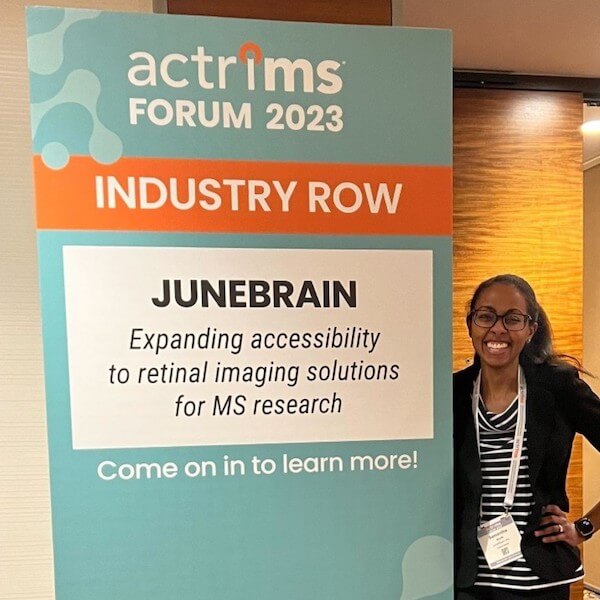
Scott presenting JuneBrain at actrims 2023
Creating a startup already requires facing many obstacles, but being a disabled founder comes with unique challenges and limitations Scott has had to overcome. The technology and startup industry are infamous for the ruthless grind culture and inhumane hours. As a patient with limited energy, Scott had to accept that she could not keep up with the classic time demands. So, she adapted, capitalizing on her limitations. Scott took advantage of a natural talent she’s had since childhood, being a supercharged nerd magnet. Through her passion, Scott created a team of talented individuals who can supplement the gaps she felt she could not fill, relying on them to support the company with the same intensity and care she does.
Another obstacle Scott continues to struggle with is wearing the hat of both founder and patient simultaneously. “It is hard because when running a startup, it is very important to separate who you are from your company; otherwise, you tie your self-worth into how the company is doing.” Scott explains, “Especially when you started the company because of something so personal to you, it gives meaning to the challenges I’ve gone through, which is great, but boundaries are also very important.”
With a working prototype, JuneBrain continues developing its wearable telehealth devices, hoping to generate revenue through customer sales for the first time this year.
Scott has been traveling to conferences and pitch competitions, raising more capital and demoing the devices for researchers nationwide. The company is also preparing to submit its device for FDA approval, taking on the arduous task in measured, calculated steps that should allow for submission by next year. Scott believes the industry is finally starting to focus on human factors testing and patient comfort. The era of highly advanced and specialized technology with low accessibility is making way for devices with simpler designs and ease of use that focus on patients. JuneBrain is at the forefront of the shift towards healthcare accessibility, especially in the eye health industry.
As a patient who struggled to make it to exhausting in-person appointments, Scott is a fierce advocate for telemedicine. The pandemic severely limited medical care for vision problems due to the necessity for the large complex machinery used to visualize eyes, emphasizing the need for more accessible eye imaging technologies. There was an apparent want and need for expansion in telehealth for people with low mobility or geographic limitations. Junebrain is working towards closing that gap, an inclusive company working on expanding inclusivity and healthcare for all.
Published on April 14th, 2023
Last updated on April 17th, 2023




